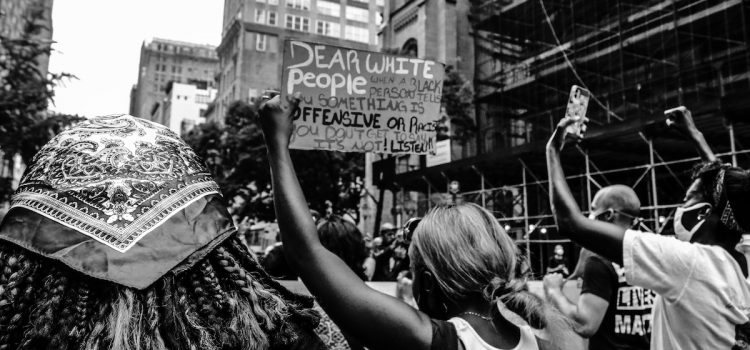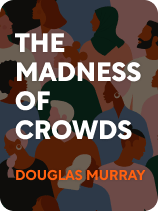

This article is an excerpt from the Shortform book guide to "The Madness of Crowds" by Douglas Murray. Shortform has the world's best summaries and analyses of books you should be reading.
Like this article? Sign up for a free trial here.
Is wokeness bad? Does it harm society or have the potential to do so?
Douglas Murray has a definite response to those questions. He believes that wokeness is hard to challenge without suffering public ridicule and shaming, which is part of the problem. But, we must fight this ideology, or our society could become even more fragmented, chaotic, and conceivably violent.
Continue reading to learn why Murray believes wokeness is bad for society.
Is Wokeness Bad?
Is wokeness bad? In The Madness of Crowds, Murray discusses several harms that wokeness already inflicts on the West and identifies two more dangers if wokeness isn’t stopped. Let’s dive into these existing and potential consequences of wokeness.
Wokeness Harms Free Speech Through “Cancel Culture”
Murray argues that wokeness is harming free speech by trying to force consensus where it doesn’t exist and punishing those who don’t conform. Its adherents decide certain viewpoints on issues such as trans rights and racism are objectively correct, and they demonize alternative opinions. Anyone who dares to offer a contrary opinion risks being subject to “cancel culture”: public ridicule and the possible collapse of their reputation, career, and livelihood. Cancel culture harms free speech and prevents discussion around significant issues that deserve open debate.
Let’s examine two examples of this curbing of free speech.
Example #1: Silencing Conservative Viewpoints
First, Murray argues that wokeness’s tendency toward censorship makes it difficult for people with conservative views to voice their opinions on hot-button issues like race, homosexuality, and transgenderism for fear of provoking public outrage. Public attitudes have rapidly become more favorable toward topics like women’s empowerment and LGBTQ+ rights, which has left many social conservatives feeling left behind and like their values are threatened. However, due to cancel culture, conservatives no longer feel able to voice this feeling.
Example #2: Masking a Lack of Scientific Consensus
Another area in which wokeness is harming free speech is in scientific discussions. Murray argues that science hasn’t corroborated many of the core assumptions now associated with Leftist views of certain topics, but woke ideology presents these assumptions as settled facts. Because of this, debate around these topics is quashed—the threat of cancel culture silences any opinion inconsistent with woke ideology. However, Murray believes that many of these topics still deserve rigorous public debate due to the true lack of scientific consensus surrounding them.
According to Murray, a topic suffering from this issue is whether or not homosexuality is a fixed state of being. Woke ideology says that homosexuality is a fully natural, immutable feature of a person’s identity, and it argues that denial of this is an act of discrimination. However, Murray points to recent statements from both the Royal College of Psychiatrists and the American Psychological Association that indicate a lack of consensus on this issue. Instead, it seems there’s still debate about whether same-sex orientation is a product of nature or nurture, and whether it’s a permanent fixture of identity or something that can be changed.
Another topic that, in Murray’s view, deserves more scientific discussion is transgenderism. He notes that gender-affirming surgery and hormone therapies may damage individuals’ long-term health—for instance, by causing irreversible sterility. However, parents of transgender children are often discouraged or intimidated from asking questions about these effects for fear of damaging or worsening their children’s mental states.
Finally, Murray also views bias tests, such as the Implicit Association Test (IAT), as scientifically problematic. These tests aim to uncover unconscious biases in the subject, such as acceptance of harmful racial stereotypes. Murray notes that there’s a lack of empirical consensus on these methods’ accuracy. However, they’ve still encouraged a neurotic tendency for white people in particular to suspect themselves of prejudices they likely don’t have, as well as triggering guilt over participating in systemic oppression against minorities that doesn’t exist.
Wokeness Creates Harmful Contradictions
Murray argues that, as well as threatening free speech, wokeness presents contradictions that can cause psychological or societal harm. Let’s examine a few examples of these contradictions.
Example #1: Intersectionality Doesn’t Equal Solidarity
According to Murray, one contradiction lies in a basic premise of intersectionality: that all oppressed groups share common interests. Instead, these interests conflict far more often than they align, producing greater friction and divisiveness. The idea that society is rife with oppressed groups inevitably leads to certain groups imagining themselves as more oppressed than others. If one group feels more oppressed than another, it considers itself entitled to more concessions and attention, creating conflict with other oppressed groups.
Murray gives the example of a Cornell University activist group named Black Students United. In 2017, the group argued that the university should favor Black students of multi-generational US descent—in other words, the descendants of enslaved people—over Black students whose families had emigrated more recently. In this case, there was divisiveness within a single racial identity.
Example #2: Undoing the Principles of Civil Rights
Murray also believes that, although adherents to woke ideology think they’re promoting equality, they’re actually undoing important civil rights accomplishments—especially those regarding minorities’ right to be judged on merit and achievement rather than their minority identities.
Dr. Martin Luther King, Jr. believed being judged according to merit was central to truly seeing a person’s talents and potential. However, Murray argues that wokeness, through practices like diversity hiring and affirmative action, has reverted to a focus on attributes like race, gender, or sexual identity, which have nothing to do with a person’s intrinsic abilities or experience.
| The End of Affirmative Action A 2023 United States Supreme Court decision ended one form of affirmative action—specifically, race-conscious university admissions. This affirmative action involved considering college applicants’ racial identities during the admissions process, in an effort to promote racial diversity on campuses. The opinions of the majority justices arguably echo Murray’s argument and his understanding of King. In the decision, the court’s conservative supermajority described affirmative action as violating the constitutional principle of color-blindness, due to the program being race-preferential rather than merit-based. However, the liberal dissenting opinion argued that the ruling threatened civil rights-era achievements by revoking constitutional promises of equal protection under the law. Affirmative action, liberal justices believed, protected people of color from institutional racism that hurt their chances of entering college. |
Example #3: Sexuality Versus Sexualization
A final example applies to contemporary feminism, which Murray contends liberates women to act in increasingly sexualized ways, such as in pop music videos, films, and media appearances. Yet, wokeness doesn’t allow men to respond to this erotic material in any way that could be construed as sexually objectifying women. This sends mixed messages to men who are simply trying to determine what healthy heterosexual expression actually is, leaving them feeling discouraged, confused, and frustrated.
| The Effects of Sexualization Whether or not one agrees or disagrees with Murray’s argument regarding the effects of this dynamic on men, some research links sexualization (the process through which someone comes to believe that their most important, overriding characteristic is their sexuality) to an increased risk of mental health problems in women and girls. Researchers for the American Psychological Association (APA) consulted numerous studies examining the effect of a wide variety of media sources—including movies, song lyrics, video games, and internet content—on female well-being. The study connected the sexualized portrayal of women and girls in these media to increased risk of low self-esteem, anxiety, eating disorders, cognitive deficits, and stunted sexual development among girls and young women who internalized their content. The study’s researchers consider these media sources to be among the strongest influences on how females gauge their value. |
What if We Can’t Fix This?
Murray predicts serious consequences for our civilization if we’re not able to effectively stem the tide of wokeness. Let’s explore two of these possible effects: societal shame and the increased risk of violence.
Potential Societal Shame
The first result of not stemming wokeness will be the continued prevalence of feelings of guilt, sin, and shame in society. Murray argues that the ideology is always concerned with assigning blame and reliving traumas of the past, leading to these negative emotions. He contends that our society is even less capable of handling these collective emotions now that traditional religion is weaker. Traditional religion at least offered us a means of using redemption, forgiveness, and love to overcome negative emotions.
| The Psychological Impact of Religion Even if organized religion were more prominent in modern society, it might not be enough to counteract guilt and shame. Not all agree that religion is an antidote to guilt or shame, even if a given theology involves ideas of redemption and forgiveness. In fact, some say religion can trigger shame. Religious trauma can arise when a person has intense guilt or shame connected to their faith, often because they feel they’ve failed that faith’s beliefs. Sometimes, toxic feelings stem from a fear of sinning. Other times, they can be tied to prohibitions around sexuality, such as when a belief system condemns homosexuality or premarital relations. With religious trauma, feelings of guilt or shame are often accompanied by a fear of punishment, or the judgment and rejection by the religious community. However, others agree with Murray that religion positively impacts people and society through its emphasis on peace, gratitude, and forgiveness. Also, religious communities frequently offer a social and spiritual support network. Finally, faith-based rituals can bring meaning to many of the key transitional moments in believers’ lives. |
Potential Widespread Violence
Another of Murray’s concerns is that wokeness’s obsession with uprooting privilege will escalate chances for large-scale violence. He specifically cites acts of violence and vandalism that occurred in connection with the Black Lives Matter movement (BLM). Murray also expresses concern that such acts will become increasingly common, masquerading as calls for justice (such as justice for George Floyd) when they’re really calls for vengeance against the perceived white majority, Western culture, and historic discrimination. He explains that the blame-casting call of wokeness feeds this vengeance.
For Murray, violence from believers in woke ideology may ultimately lead to the majority white population retaliating against the oppressive, totalitarian nature of wokeness. He fears that these retaliators will believe minority identity groups are responsible for wokeness, and these retaliators will target these groups for reprisals. This could set the clock back on many of the hard-fought rights that minority groups have achieved in recent decades. Murray thinks it’s possible that when the majority retaliates, it may use what it sees as similar methods of censorship, humiliation, and villainization.

———End of Preview———
Like what you just read? Read the rest of the world's best book summary and analysis of Douglas Murray's "The Madness of Crowds" at Shortform.
Here's what you'll find in our full The Madness of Crowds summary:
- That Western society is consumed by social justice and identity politics
- Why we must combat this ideology and restore opportunities for disagreement
- How conservative viewpoints are being silenced and possible remedies






